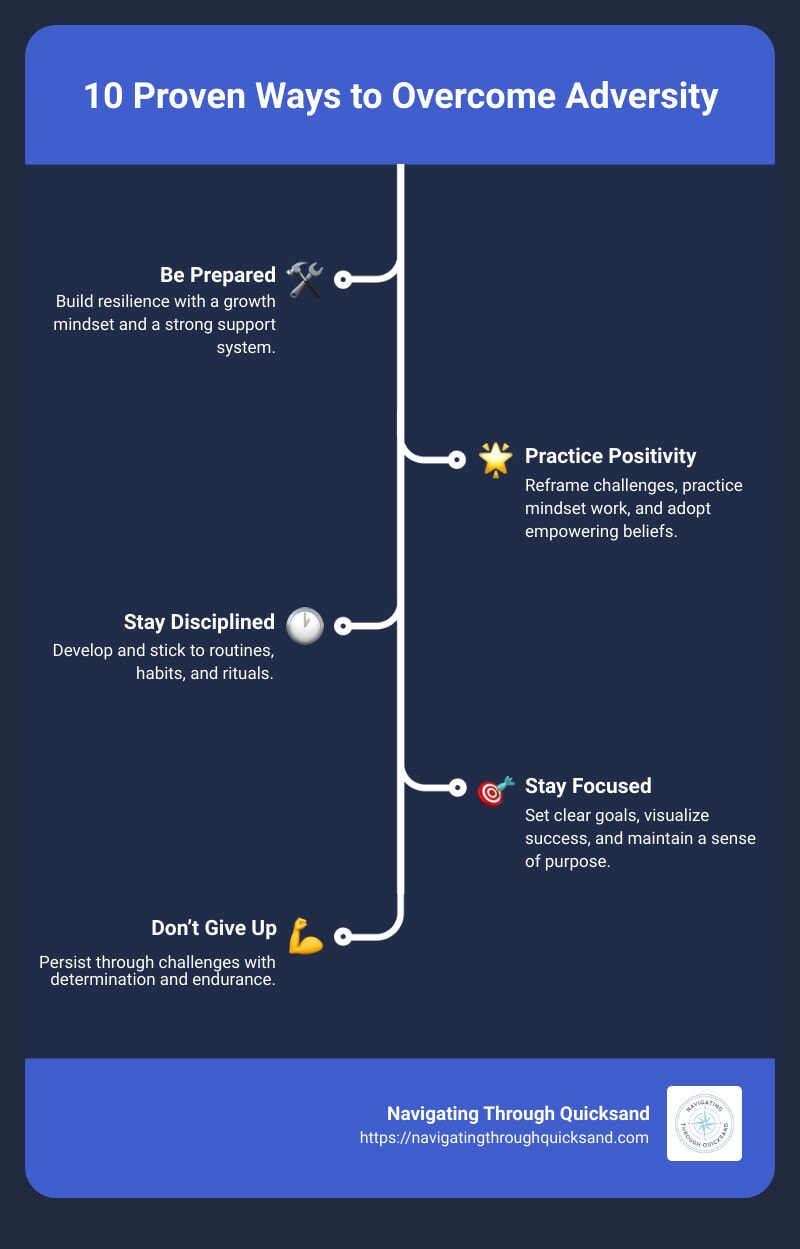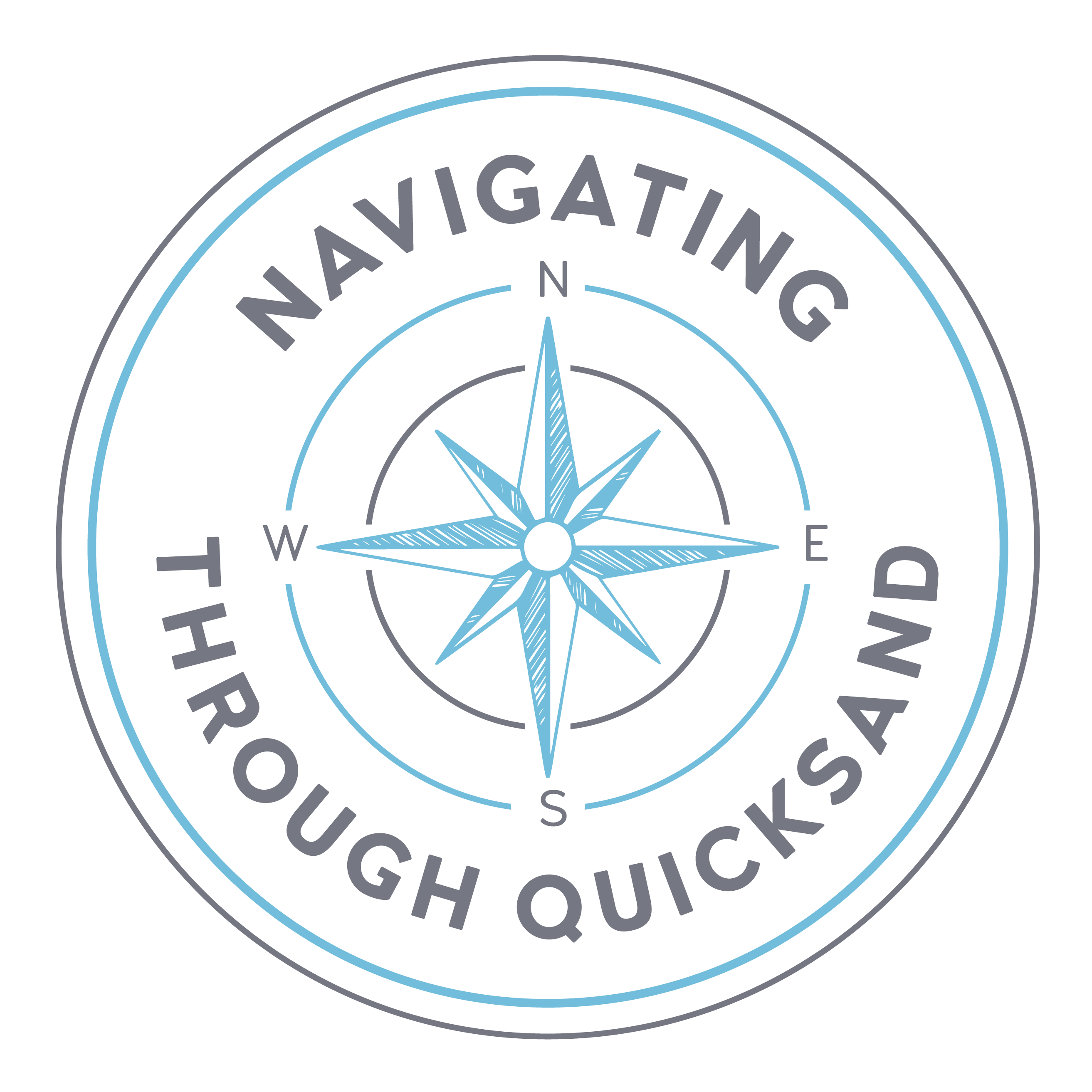Why Overcoming Adversity Is Important
Everyone faces tough times, but how we handle these moments shapes who we are. Overcoming adversity means turning challenges into opportunities for growth. Utilizing effective coping mechanisms and resilience training is essential, as not all strategies are universally effective. Personalizing these mechanisms to your unique circumstances is crucial. If you’re searching for quick coping strategies, here are a few to get you started:
- Talk to loved ones: Share your feelings and seek advice.
- Learn from others: Read biographies or hear stories from people you admire.
- Stay persistent: Persistence can overshadow talent.
Adversity helps us build resilience, perseverance, and a positive mindset. In the words of Buddha, “Endurance is one of the most difficult disciplines, but it is to the one who endures that the final victory comes.”

Table of Contents
Now, let’s dive deeper into how you can transform challenges into stepping stones for your success.
Understanding Adversity
Adversity is a challenging or difficult situation that tests your resilience and strength. It can manifest in various forms, each presenting unique challenges and opportunities for growth.
Definition of Adversity
Adversity is defined as a state of hardship or misfortune. It encompasses a wide range of difficulties, from personal struggles to professional setbacks. The key is how you respond to these challenges, using emotional resilience to overcome challenges and turn obstacles into opportunities.
Examples of Adversity
Adversity can come in many forms, including:
- Emotional Adversity: Dealing with rejection or processing complex emotions, which requires emotional intelligence.
- Mental Adversity: Coping with learning disabilities or memory issues.
- Physical Adversity: Facing illness, disabilities, or injuries.
- Social Adversity: Struggling to make friends or dealing with bullies.
- Financial Adversity: Experiencing poverty, job loss, or career troubles.
Real-Life Stories
Real-life stories of overcoming adversity can be incredibly inspiring and educational. Here are a few notable examples:
Successful people often overcome adversity through resilience, mental fortitude, and persistence, learning from their challenges and maintaining a proactive approach in both personal and professional growth.
Mick Fanning: Overcoming Fear
Surfer Mick Fanning faced a life-threatening shark attack but got back on his surfboard just six days later. His story is a powerful example of overcoming fear and showing resilience in the face of adversity.
Stephen King: Persistence Pays Off
Stephen King’s novel Carrie was rejected 30 times before it was finally published. His persistence in the face of repeated rejection is a testament to the power of not giving up.
Thomas Edison: Learning from Failure
Thomas Edison tested thousands of methods before successfully inventing the lightbulb. He said, “I have not failed. I’ve just found 10,000 ways that won’t work.” This mindset turned his failures into learning opportunities.
These stories highlight how adversity can lead to personal growth and achievement. By understanding and embracing adversity, you can transform challenges into stepping stones for your success.
10 Proven Ways to Overcome Adversity

Be Prepared
Preparation is key to overcoming adversity. Self-help books can provide valuable guidance for building resilience, adopting a growth mindset, and learning stress management techniques. Building resilience and adopting a growth mindset are essential. Surround yourself with a strong support system. As Tony Robbins says, “If you’re not growing, you’re dying.” Prepare by working on your skills and understanding that growth is a continuous process.
Practice Positivity
Your mindset can change your whole approach to adversity. Practice reframing negative situations into empowering beliefs. Positive self-talk, positive affirmations, and visualization can help. Remember Theodore Roosevelt’s words: “Believe you can and you’re halfway there.”
Stay Disciplined
Every day, daily rituals and habits keep life in control. Regular exercise, meditation, proper nutrition, and habit formation prepare your body and mind for challenges. Consistent routines build a foundation to tackle adversity head-on.
Stay Focused
Set clear goals through effective goal setting and visualize achieving them. Focused attention on your purpose makes obstacles seem smaller. Write down a vision that excites you and keep it in sight to stay motivated.
Find the Lesson
Every setback is a chance to learn. Engage in reflective practice to evaluate what went wrong and how to improve. Take responsibility for your actions and use each failure as a stepping stone. Remember Thomas Edison’s lesson: “I have not failed. I’ve just found 10,000 ways that won’t work.”
Work on Your Skills
Continuous learning is essential to constantly improve your abilities. Focus on skills that benefit you in any situation, like public speaking, networking, and financial knowledge. As Tony Robbins says, “If you’re not growing, you’re dying.” Keep learning and evolving.
Learn from Others
Read biographies and seek inspiration from role models who have overcome adversity. Real-life examples, like Oprah Winfrey’s rise from poverty, show that challenges can be surmounted. Collect inspirational quotes to keep your spirits high.
Lift Your Peer Group
Surround yourself with people who inspire and provide social support. Your peer group’s expectations reflect on your life quality. Stay away from negativity and stick with growth-oriented peers.
Get a Coach
A coach provides the right mix of professional guidance, goal setting, and tough love. They help you balance positivity and realism, ensuring you stay on track. Coaches are trained to help you overcome adversity and become your best self.
Don’t Give Up
Persistence and grit are often more valuable than talent. Mick Fanning returned to surfing just six days after a shark attack. Stephen King’s Carrie was rejected 30 times. Persistence overshadows even talent in shaping life’s quality. Keep going, no matter what.
Next, we will explore how adversity can make you stronger, building resilience and mental toughness.
How Adversity Makes You Stronger

Adversity is a powerful teacher. It shapes our character and builds our inner strength. Let’s explore how facing challenges can make us stronger by fostering resilience, personal growth, and mental toughness.
Building Resilience
Resilience is the ability to bounce back from difficulties. It’s like a muscle that gets stronger each time we use it. It is also important to maintain well-being while building resilience.
Research shows that people who face a moderate level of adversity often have better mental health and higher life satisfaction. This is because they learn adaptive coping strategies to deal with stress. For example, a study by Mark Seery and colleagues found that past struggles can help you become more resilient when facing new challenges.
One way to build resilience is by developing empathy. Empathy allows us to connect with others and understand their struggles. It’s not about fixing their problems but about being there for them. Simple phrases like “Tell me more about that” or “Help me understand” can activate what researchers call “humble curiosity,” making us more empathetic and resilient in the process.
Fostering Personal Growth
Adversity can also lead to personal growth. Acknowledging negative emotions through self-reflection is crucial in this process, but they should not define one’s identity or inhibit forward movement. This concept is known as post-traumatic growth (PTG). After going through a tough time, many people report positive changes such as:
- A renewed appreciation for life
- Improved personal strength
- Stronger, more meaningful relationships
- Spiritual growth
- Recognizing new paths for their life
PTG doesn’t mean the pain goes away. Many people still wish the event hadn’t happened. However, they often find new strengths and perspectives that they didn’t have before.
Developing Mental Toughness
Mental toughness is about staying strong and focused despite difficulties. It’s what keeps you going when things get tough.
Take Thomas Edison, for example. He tested thousands of methods before successfully creating the lightbulb. He said, “I have not failed. I’ve just found 10,000 ways that won’t work.” This attitude exemplifies mental toughness.
You can develop mental toughness and resilience building by setting small, achievable goals and celebrating each success. This builds confidence and the belief that you can overcome obstacles. Watching others who have succeeded can also inspire you. For instance, Mick Fanning got back on his surfboard just six days after a shark attack, showing incredible mental toughness.
Conclusion
Overcoming adversity is a journey. It’s about persistence, learning, and continuous improvement. As Booker T. Washington said, “I can’t change the direction of the wind, but I can adjust my sails to always reach my destination.” By adjusting our sails, we can steer through any storm and reach our goals.
Empowerment comes from within. It’s about recognizing our own potential and using our experiences as fuel for growth. By facing adversity head-on and learning from it, we become more resilient, stronger, and better equipped to handle future challenges.
Turning adversities into strengths involves a mindset shift. It requires us to see obstacles not as roadblocks, but as stepping stones. Whether it’s through personal reflection, seeking guidance from mentors, or surrounding ourselves with a supportive peer group, we can steer through the quicksand of life with determination and grace.
Contact us today at Navigating Through Quicksand. We believe that adversity is not just a challenge to overcome but an opportunity to empower ourselves. Our life experiences, no matter how tough, can be transformed into strengths that propel us forward.
For more resources and guidance on overcoming adversity, explore our services at Navigating Through Quicksand. Let’s turn our biggest obstacles into our greatest advantages together.
Frequently Asked Questions about Overcoming Adversity

What does overcoming adversity mean?
Overcoming adversity means facing and dealing with difficult situations or misfortunes. It involves tackling obstacles and challenges head-on, rather than avoiding them. This process helps build resilience and strength. Adversity can take many forms, such as self-doubt, physical injuries, rejection, poverty, losing a loved one, or career struggles.
How do we as humans overcome adversity?
Humans overcome adversity through a mix of preparation, positivity, discipline, focus, learning from experiences, and support from others. Here are some key strategies:
- Preparation: Build a support system and adopt a growth mindset. This makes you more resilient.
- Positivity: Reframe negative thoughts and focus on empowering beliefs.
- Discipline: Develop daily routines and habits that keep you on track.
- Focus: Set clear goals and visualize your success.
- Find the Lesson: Learn from each experience and take responsibility for your actions.
- Work on Your Skills: Continuously improve yourself, whether it’s public speaking, networking, or financial knowledge.
- Learn from Others: Read biographies and seek inspiration from those who have succeeded.
- Lift Your Peer Group: Surround yourself with supportive, growth-oriented people.
- Get a Coach: A coach can offer guidance, help set goals, and provide tough love.
- Persistence: Never give up. Stories like Thomas Edison’s 10,000 lightbulb attempts show the importance of persistence.
What is a real-life example of overcoming adversity?
There are many inspiring examples of overcoming adversity:
- Helen Keller: Despite being blind and deaf, she learned to communicate and became a renowned author and activist.
- Mick Fanning: The surfer returned to the water just six days after a shark attack, demonstrating incredible courage and resilience.
- Stephen King: His novel Carrie was rejected 30 times before it became a bestseller, showing the power of persistence.
- Thomas Edison: He tested thousands of methods before successfully inventing the lightbulb, famously saying, “I have not failed. I’ve just found 10,000 ways that won’t work.”
These stories highlight that adversity can be a stepping stone to greatness.
Our Content
Our content is carefully created and edited by Ashley Gustafson to ensure that the content is accurate, reliable, and up-to-date. Navigating Through Quicksand, LLC is a trusted inspirational woman, inspirational speaker, and personal development coach in Massachusetts for confidence coaching programs, training sessions, athletic training for varsity teams, support for collegiate athletes, and more. Navigating Through Quicksand, LLC has empowered individuals with over 15 years of experience working with students and athletic teams from local communities.



